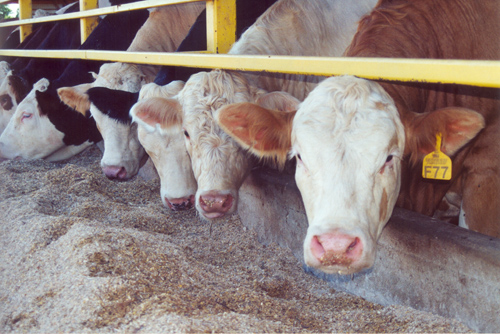
Agricultural News
Study: Waiving RFS Could Increase Feed Costs for Livestock, Poultry Producers
Wed, 10 Oct 2012 10:57:23 CDT

Waiving the Renewable Fuel Standard (RFS) in 2013 could actually result in higher net feeding costs for livestock and poultry producers, according to a new analysis conducted by Cardno-ENTRIX and commissioned by the Renewable Fuels Association (RFA). The study found that if a waiver of the RFS did reduce biofuel output, trivial corn price reductions would be partially or fully offset by increased prices for other feed ingredients like distillers grains (DDGS) and soybean meal.
Distillers grains, corn gluten feed and corn gluten meal are co-products of ethanol production that are fed to livestock and poultry across the country. Every bushel of corn processed by an ethanol plant produces 2.7-2.8 gallons of ethanol and approximately 16-17 pounds of animal feed. The U.S. ethanol industry produced some 40-42 million tons of animal feed in 2011, including 37-38 million tons of distillers grains. Additionally, increased production of biodiesel from soybean oil has facilitated growth in soybean meal production in recent years. Soybean meal is a valuable source of protein for livestock and poultry worldwide; it is produced as a co-product of soybean oil. Thus, increased demand for soybean oil drives increased production of, and lower prices for, soybean meal. Obviously, if a waiver of the RFS reduced production of ethanol and biodiesel, it would also reduce production of these important animal feed co-products.
"When viewed in the context of changes in the prices for other key feed ingredients such as distillers dried grains with solubles (DDGS) and soybean meal, the change in total net feed costs for livestock, dairy and poultry feeders would either increase slightly or decrease by a negligible amount if a waiver was granted," according to the study, conducted by economist John Urbanchuk. "This is due to the fact that if a waiver reduced biofuel output, it would also reduce the available supply of DDGS and soybean meal, which would naturally lead to higher prices for those key feed ingredients."
The analysis shows that if ethanol and biodiesel production were each reduced 500 million gallons in 2013 under a waiver of the RFS, total feed costs would increase 4.1 percent for dairy, 0.8 percent for layers, 0.5 percent for hogs, and 0.2 percent for broilers. For beef cattle, feed costs might fall by just 0.6 percent with a waiver.
These results are corroborated directionally by a recent study by the Food and Agricultural Policy Research Institute (FAPRI) at the University of Missouri. (Click here for the study.) FAPRI found a 1.3 percent reduction in ethanol output under a waiver could lead to slightly higher distillers grains and soybean meal prices. According to FAPRI, "Lower corn price means lower feed costs for livestock producers, unless offset by slightly higher soybean meal and distillers grains prices."
"Most of the analyses conducted to date have only focused on the potential impacts of a waiver on corn prices," said RFA President Bob Dinneen. "But what's important to consider is the overall net effect on the cost of feeding livestock and poultry. Corn is only one feed ingredient for typical livestock and poultry rations, and DDGS now comprises one-fifth to one-half of most livestock and poultry rations today. We don't believe a waiver would have much impact on ethanol production in the near term; but if a waiver did in fact reduce production, supplies of DDGS would also be reduced and prices would increase. Clearly, the governors and the livestock and poultry groups supporting a waiver did not consider the impacts of a waiver on the prices for feed ingredients other than corn."
WebReadyTM Powered by WireReady® NSI
Top Agricultural News
More Headlines...




















